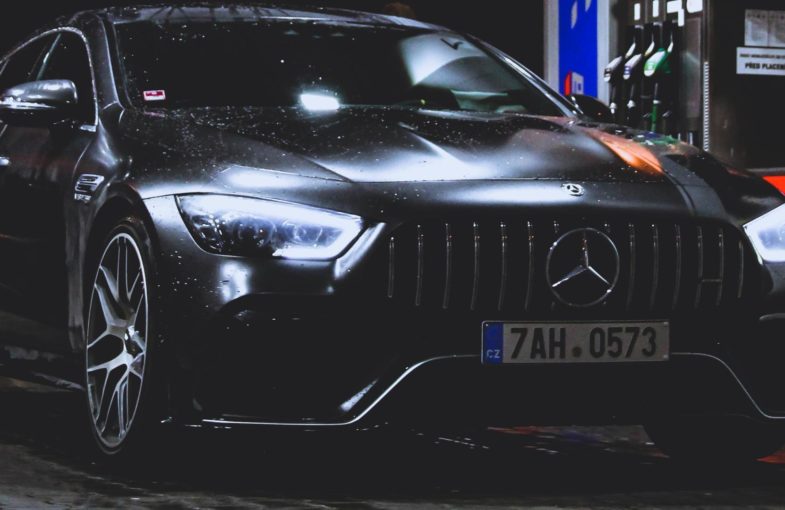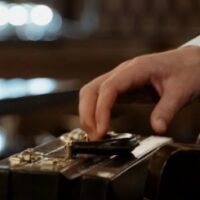The zig of the big black sedan up ahead didn’t spiral into any kind of evasive maneuver. In what felt like a tremendous risk I took my attention off Atwell and the pursuit to assess our surroundings: With a rumble over the tram tracks that marked the unofficial periphérique around Old Town the cars continued to head north. We were headed on a gradual slope up, the only way you could go when first headed away from the Promenade and the sea. The houses around us were getting smaller and older, the tended gardens of inland homes becoming wild oak scrub and maquis. If the city had any place that could be called middle class, this was it, a space between the working poor and the truly wealthy that didn’t want to be near them.
“Why would Mitnick want the corpse found?”
I brought my gaze back to Atwell and let him feel the stupidity of the question. I let that sit on him and then said, “Because if it’s found, Sartre will lose his political projection. If Sartre loses his protection Mitnick can start that fight you’re so desperate to prevent.”
In a childishness so thick it permeated the car Atwell responded, “It’s important that doesn’t happen.”
Wanting to keep his head in the game I agreed, “Right.” I added with emphasis, “National security.” Indicating Sartre’s faraway cars with a thrust of my chin, “So for national security I want to know where Sartre has it. In case I’m right and Mitnick comes sniffing around.”
The gentle upward incline away from the ocean pivoted to a gradual slope down. We were headed into the lowlands that separated the poorer banlieues like Les Moulins and Triaite from the rest of the city. The thin traffic disappeared completely, causing Atwell to fall even further back until the lights of Sartre’s cars were only distant, angry stars. If the Frenchman hadn’t had the latest in automobile tech, we probably wouldn’t have been able to see them at all.
The car filled with the quiet sound of the wind over its frame, only accompanied by tires on the increasingly rough pavement and the occasional rattle. The quiet persisted for a blissfully long time, until I sensed that Atwell might open his mouth again. Mostly as a preemptive effort to prevent being asked more questions, I said “So why are you following Sartre?”
Squinting at the cars ahead as if through a telescope Atwell replied, “Just keeping tabs on things.” If he hadn’t been concentrating so much, he probably would have made the ambiguous answer more believable.
Taking advantage of his distracted state I answered with a non-committal, “Uh-huh,” and peered over my shoulder into the backseat. Amongst empty coffee cups, crushed cigarette packs, and a bottle of wine, there were a few small, smooth cases of unidentifiable equipment. There was also a camera, telescopic lens, and tripod. Given that out of the equation of Sartre and Mitnick, Sartre was the known quantity, I wondered why Atwell would be interested in snapping photos of the Night Governor. I reached back and grabbed a pair of binoculars that had been thrown in with the rest of the pile.
The convoy headed north, out towards the A8. We followed, and kept on long enough that I began to wonder just how far they would go. Off to the west, up on one of the inland mountains that surrounded the lowlands was the city’s largest hospital and I wondered if we were headed there. Sartre’s car kept driving north, though, and the fluorescent lit medical giant receded away from us.
Sartre and his boys kept heading north until the horizon began to lighten with a glow even more powerful than Sartre’s headlights or the hospital’s flood lamps. As we continued to north delivery vans and lorries began to pass us in the opposite direction, back into the city. I took a quick glance at a few of them – food systems, ice trucks, bottled water. Probably all headed out for early morning deliveries.
We came around a bend in the road to see what could have been a stadium made of hills and trees; a thick boundary of stone pine and ash trees behind which emanated a light so bright it blocked out the pre-dawn sun. Out the single visible break in this border, a road lolled out like a tongue, lorries and semi-tractor trucks moving in and out with a coordinated speed.
We pulled into that entrance to find a flat pan, a paved surface so wide it occupied the entire massive area within the grove, a valley bustling with movement and cleared of every living plant to the treeline. In their stead were tall poles lit the area like burning swamp gas. Semi-tractor trucks and lorries jostled for position on the tarmac. Industrial carts and forklifts zipped in and out of them like small mammals eating between crocodile teeth.
The smaller trucks headed into town had come from here – a place as old and genteel as the city didn’t want and couldn’t handle the modern monsters of semi trucks. The transfer station sat well outside of the city, existing to ferry in all the goods and luxuries that the wealthy would want from the outside world. The place was big enough to be a small town in and of itself. Like everything else working class in this city, it was carefully hidden from the locals and tourists it served, camouflaged behind the ridges of trees and shrubs. There could have been a vineyard just down the road and you’d never be able to tell.
There was so much activity I almost lost track of Sartre’s convoy. It helped that he drove in like he owned the joint. Hell, maybe he did. Atwell only slowed enough to get lost in the criss-cross of the commercial traffic before following in.
To read the previous chapter, go here.
To read the next chapter, go here.
See the author’s published work here.
Related Posts
The Case of the Floating Boy Next Post:
Late Christmas























